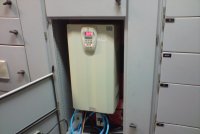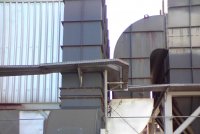One of the largest food producers in Brazil, Cargill, invests in energy efficiency using WEG optimising solutions. At the beginning of the year (2010), the company installed two WEG frequency inverters on the motors of a boiler at a unit in Ponta Grossa, state of Paraná. The unit is part of a soya bean complex which buys, sells and processes soya and other oil seeds. According to Gilmar Weidner, of WEG’s service network, this installation has produced the expected result. “The customer has quickly achieved his goal, which is to reduce energy, whilst maintaining quantity and quality of output.”
Working together with Cargill in 2009, WEG carried out studies to find the best ways to save energy, rationalize operations and update the production complex. Through examinations in place, several improvement opportunities were identified. These included re-powering of the fan motors, the installation of frequency inverters on the motors for the 200-HP and 60-HP fans, and automatisation of the overall system. With the inverters, it was possible to eliminate the mechanical dampers used on the fans, gaining much higher efficiency from their drive motors (see results below). These results will soon be improved further, as two of the motors on the boiler at Cargill in Ponta Grossa are to be replaced with two of WEG’s new W22 Premium efficiency motors.
Energy efficiency results with 60 HP motor:
- Savings of 37 kWh.
- Estimated savings of 144,607 kWh of electricity per year.
- Return of investment: 11 months.
- Energy savings with motor + frequency inverter: US$ 14,512/year.
- Investment with motor + frequency inverter: US$ 12,236
Application engineering results with 200 HP motor:
- Savings of 48 kWh.
- Estimated savings of 509,416 kWh/year.
- Return of investment of repowering the motor to 150 HP, W22: 7 months.
- Energy savings with motor + frequency inverter: US$ 42,5000/year.
- Investment with motor + frequency inverter: US$ 23,360
New Energy Efficiency law
The W22 Premium motors are already in conformity with the new energy efficiency standard, which will take effect as of January of 2010. They assure high efficiency, reliability and very low operation costs. In fact, the cost/benefit relation of the W22 is excellent, especially in terms of energy savings, but also in terms of reduced levels of noise and ease of maintenance.







